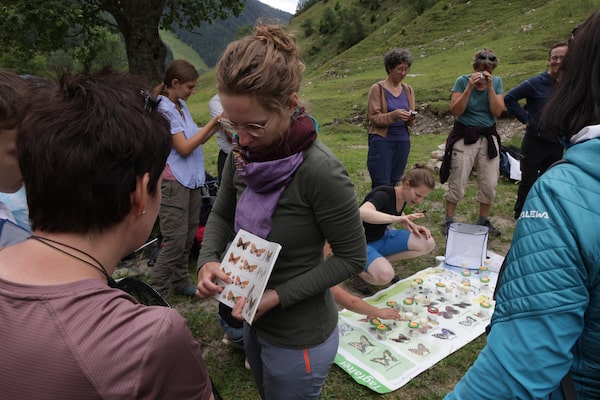If you’re reading this on the web or someone forwarded this e-mail newsletter to you, you can sign up for Globe Climate and all Globe newsletters here.
Good afternoon, and welcome to Globe Climate, a newsletter about climate change, environment and resources in Canada.
The University of Guelph is taking “saving the bees” to another level. Their new state-of-the-art honey bee facility will focus on researching, monitoring and educating the public about honey bees, and will be a key tool in the fight against declining populations.
Now, let’s catch you up on other news.
Noteworthy reporting this week:
- Heat: Expect an abnormally hot summer after unprecedented wildfires, Environment Canada says
- Wildfires: Air quality advisories in effect as wildfires continue to rage in several provinces
- Biodiversity: How a B.C. lake’s evolutionary superstar highlights biodiversity’s importance – and the threats against it
- In the kitchen: Climate fight enters kitchens as restaurants ponder switch from gas stoves to induction cooktops
- Energy: Canadian electricity demand to surge as country pursues net-zero goals
- Green investing: Canada’s green taxonomy playbook stuck in limbo, industry group says
- Oil and gas: Natural gas industry urges Ottawa to obtain emission credits for LNG exports
- Explained by The Narwhal: Can good things still grow in Ontario? Development push adds pressure to shrinking farmland
A deeper dive
Music meets climate change
Jeffrey Jones is The Globe’s ESG and sustainable finance reporter. For this week’s deeper dive, he takes a different direction, and talks about how Canada’s music industry is evolving.
Nothing beats great live music. Watching a killer band make magic up on stage allows us, at least for a time, to forget our personal stresses and all of the problems swirling outside the venue. Now, though, the existential problem of climate change is affecting even the sweet sounds that provide us with respite.
Outdoor music festivals – a rite of Canadian summer – could be affected by the wildfire smoke that has blanketed regions across the country this year. (Yes, I know climate change does not start wildfires, but it certainly helps create the conditions for them to ignite more easily and spread quickly.) For fans, that could mean attending concerts becomes uncomfortable and breathing difficult.
But what of the artists? There’s a risk some could find it too hard to sing or play their instruments on stage. Heatwaves, floods and other natural disasters can also play havoc with concerts and touring. These are just a few of the effects, and as I found out reporting on a story about the Canadian industry and its role in the climate battle, musicians and others have adopted a dual-track approach to the problem. One is using their voice with fans to spread the message that this is an important issue that requires major solutions. The other involves making efforts to shrink their own environmental footprints. A non-profit called Music Declares Emergency is rounding up support across the industry through conferences and other events.
I spoke with Canadian guitarist Donna Grantis, known for her work as a solo artist and a member of Prince’s 3rdeyegirl band (The lady can shred). She’s weaved the climate issue into her musical pursuits. One initiative is her involvement with legendary producer Brian Eno’s EarthPercent program, in which artists contribute a portion of their royalties to climate-related causes. She joins a long line of musicians who see part of their responsibility as helping to drive important discussions.
“There’s tremendous potential to accelerate climate solutions by influencing the way people feel and think about human impacts on earth and as a force for social change,” she says. “I really believe that music and the arts play a vital role in igniting the cultural response that’s needed to address the intersection crises we face.”
- Jeff

Summer Serenades at Calgary Folk Music Festival in 2021Mike Tan/CFMF
What else you missed
- Canada, United States expand agreement to help each other fight wildfires
- Europe in danger of losing race to become global EV battery powerhouse, report says
- Prime Minister Trudeau pushes idea of hydro loop connecting Quebec, Atlantic region
- B.C. launches $20-million flood mitigation fund for the Fraser Valley
- UN members adopt first-ever treaty to protect marine life in the high seas
- Paris climate summit ends without a deal on global tax on shipping
- Environmental group raises concern about flooding at Alberta coal mines
- One in four Canadians say they have been affected by wildfires this year, poll shows
- Biden administration moves to restore endangered species protections dropped by Trump
- Winter cold snap in B.C. cut 2023 grape crop by up to 56 per cent: growers
- Canada moving too slow to counter U.S. Inflation Reduction Act, industry association says
- IMF applauds Canada’s climate action, but warns subsidies could stoke international ‘race to the bottom’
Opinion and analysis
Laura Trethewey: Deep-sea mining for battery minerals is coming – thanks to a Canadian firm
Jyoti Gondek: Is Calgary still an oil and gas town or has it moved on?
Marsha Lederman: With more forest fires, alternate roads to communities like Tofino are no luxury
Editorial board: On the road to Whistler, politicians can learn a lesson on how to make Canada more resilient
Green Investing
International sustainability board issues new disclosure rules
New global sustainability reporting standards for companies were formalized today, though Canadian businesses will have several months to prepare as a domestic standards body and financial regulators work out the details of how they will be adopted in this country.
The board is publishing its first two measures aimed at setting a global baseline for reporting on carbon emissions and other environmental and social issues that have material impact on the financial health of companies. The rules are set to become effective at the start of 2024, but they won’t automatically be mandatory.
- Climate to be main driver as leaders aim to shake up financial system at Paris summit
- IMCO invests US$400-million in Swedish battery maker Northvolt
- Church of England Pensions Board to divest from Shell for lagging on climate targets
- Tesla returns to S&P 500 ESG index with more environmental disclosures
Making waves
Each week The Globe will profile a Canadian making a difference. This week we’re highlighting the work of Dr. Louise Archer doing polar bear research.
Dr. Louise ArcherHandout
Hi, I’m Dr. Louise Archer, 31, from Scarborough, Canada (but originally from Cork, Ireland).
I am a postdoctoral fellow researching polar bear responses to climate change. Increased sea-ice melt means bears are facing longer periods without access to energy-rich seals. With the support of Polar Bears International, my colleagues and I are developing mathematical models of how polar bears take in and use up energy – a bit like calorie counting, for bears.
By linking these models with climate projections, we can forecast how polar bear survival will be affected by future sea-ice loss, giving us insight into the risks faced by polar bear populations across the Arctic.
Models also show us the outlook for polar bears will improve if we act now to reduce carbon emissions. I find this incredibly motivating – encouraging a just transition to renewable energy sources is vital – by leveraging our voices in our communities and making climate a priority when voting, we will benefit not only polar bears and other vulnerable species, but also people across the world.
- Louise
Do you know an engaged individual? Someone who represents the real engines pursuing change in the country? Email us at GlobeClimate@globeandmail.com to tell us about them.
Photo of the week

Eva Hengsberger (C), a biologist and employee of the Viel-Falter butterfly and moth monitoring program, explains local butterfly species during participation by volunteers in data collection in the Valsertal alpine valley in Tyrol on June 25, 2023 near Innervals, Austria. The Viel-Falter initiative, lead by the University of Innsbruck, is operating a nationwide monitoring program that combines scientific and volunteer data collection on Austria's butterfly and moth populations. The data serves as an indicator to assess the state of biodiversity across the country, which, like elsewhere across Europe, is in steep decline. Human intrusion, through agriculture, water diversion, urban sprawl, construction and other activities that destroy natural habitats, has caused the decline, and climate change is becoming an increasing threat, especially in Alpine regions, which are warming twice as fast as the global average.SeanGallup/Getty Images
Guides and Explainers
- Want to learn to invest sustainably? We have a class for that: Green Investing 101 newsletter course for the climate-conscious investor. Not sure you need help? Take our quiz to challenge your knowledge.
- We’ve rounded up our reporters’ content to help you learn about what a carbon tax is and just generally how Canada will change because of climate change.
- We have ways to make your travelling more sustainable and if you like to read, here are books to help the environmentalist in you grow, as well as a downloadable e-book of Micro Skills - Little Steps to Big Change.
Catch up on Globe Climate
- Meet the Coast Salish woman protecting the North Pacific’s orca whales
- The dangers of breathing wildfire smoke
- Canada’s data gap in tracking wildfire risks
- The Indigenous community fighting fire with fire
We want to hear from you. E-mail us: GlobeClimate@globeandmail.com. Do you know someone who needs this newsletter? Send them to our Newsletters page.
 Sierra Bein
Sierra Bein